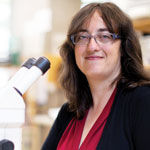Professor Juan Carlos Izpisua Belmonte, co-first author Hsin-Kai Liao and colleagues developed a novel CRISPR/Cas9 genome-editing therapy that can suppress the accelerated aging observed in mice with Hutchinson-Gilford progeria syndrome, a rare genetic disorder that also afflicts humans. The treatment provides insight into the molecular pathways involved in accelerated aging, as well as how gene therapy can be used to reduce toxic proteins.
Featured Stories
 Kay Tye – Breaking down the brainKay Tye, the newest addition to Salk’s faculty, is a burst of energy who can chat about everything from the mysteries of the brain to the intricacies of a breakdance move. In this Q&A, she discusses her roundabout journey to science, her passion for mentorship and her love of life outside the lab.
Kay Tye – Breaking down the brainKay Tye, the newest addition to Salk’s faculty, is a burst of energy who can chat about everything from the mysteries of the brain to the intricacies of a breakdance move. In this Q&A, she discusses her roundabout journey to science, her passion for mentorship and her love of life outside the lab. How to stop a killerPancreatic cancer is one of the most difficult cancers to detect and treat, in part because of an impenetrable "shield" that forms around the tumor. Salk scientists, many of whom have a personal connection to cancer, are leading the charge in new approaches to tackle this deadly disease.
How to stop a killerPancreatic cancer is one of the most difficult cancers to detect and treat, in part because of an impenetrable "shield" that forms around the tumor. Salk scientists, many of whom have a personal connection to cancer, are leading the charge in new approaches to tackle this deadly disease. Travis Berggren – Working at the intersection of biology and technologySenior Staff Scientist Travis Berggren shares his path to Salk and his perspective on how advances in technology facilitate world-changing discoveries in genetics, neuroscience, cancer, immunology, plant biology and other areas.
Travis Berggren – Working at the intersection of biology and technologySenior Staff Scientist Travis Berggren shares his path to Salk and his perspective on how advances in technology facilitate world-changing discoveries in genetics, neuroscience, cancer, immunology, plant biology and other areas. Graziana GattoPostdoctoral Fellow Graziana Gatto comes to Salk from Italy, bringing her passion for scientific outreach and keen insights into how various sensations-like pain, itching or touch-are processed by the brain.
Graziana GattoPostdoctoral Fellow Graziana Gatto comes to Salk from Italy, bringing her passion for scientific outreach and keen insights into how various sensations-like pain, itching or touch-are processed by the brain.






















































